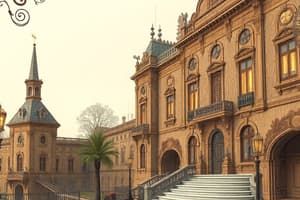Podcast
Questions and Answers
इतिहास किसका अध्ययन है?
इतिहास किसका अध्ययन है?
- भविष्य
- भूगोल
- अतीत (correct)
- वर्तमान
निम्नलिखित में से कौन सा ऐतिहासिक स्रोतों का उदाहरण है?
निम्नलिखित में से कौन सा ऐतिहासिक स्रोतों का उदाहरण है?
- आर्थिक मॉडल
- वैज्ञानिक प्रयोग
- प्रत्यक्षदर्शी खाते (correct)
- भविष्य की भविष्यवाणियां
इतिहास में 'पीरियडाइजेशन' का क्या अर्थ है?
इतिहास में 'पीरियडाइजेशन' का क्या अर्थ है?
- सांस्कृतिक मूल्यों का विश्लेषण
- कारण और प्रभाव का अध्ययन
- घटनाओं का एक क्रम
- अतीत को युगों में विभाजित करना (correct)
इतिहास का कौन सा शाखा शक्ति, सरकार और राजनीतिक आंदोलनों पर केंद्रित है?
इतिहास का कौन सा शाखा शक्ति, सरकार और राजनीतिक आंदोलनों पर केंद्रित है?
इतिहास का कौन सा पहलू महत्वपूर्ण सोच कौशल विकसित करने में मदद करता है?
इतिहास का कौन सा पहलू महत्वपूर्ण सोच कौशल विकसित करने में मदद करता है?
कौन सा दृष्टिकोण ऐतिहासिक घटनाओं को एक कहानी के रूप में प्रस्तुत करता है?
कौन सा दृष्टिकोण ऐतिहासिक घटनाओं को एक कहानी के रूप में प्रस्तुत करता है?
इतिहास का अध्ययन क्यों महत्वपूर्ण है?
इतिहास का अध्ययन क्यों महत्वपूर्ण है?
ऐतिहासिक स्रोतों का उपयोग कौन करता है?
ऐतिहासिक स्रोतों का उपयोग कौन करता है?
इतिहास के किस क्षेत्र में युद्ध का अध्ययन किया जाता है?
इतिहास के किस क्षेत्र में युद्ध का अध्ययन किया जाता है?
इतिहास का 'विश्लेषण' क्या है?
इतिहास का 'विश्लेषण' क्या है?
सांस्कृतिक विरासत को संरक्षित करने में कौन मदद करता है?
सांस्कृतिक विरासत को संरक्षित करने में कौन मदद करता है?
इतिहास के किस क्षेत्र में विचारों का अध्ययन किया जाता है?
इतिहास के किस क्षेत्र में विचारों का अध्ययन किया जाता है?
कौन सा दृष्टिकोण ऐतिहासिक घटनाओं की पारंपरिक व्याख्याओं को चुनौती देता है?
कौन सा दृष्टिकोण ऐतिहासिक घटनाओं की पारंपरिक व्याख्याओं को चुनौती देता है?
इतिहास में 'कारण' का क्या अर्थ है?
इतिहास में 'कारण' का क्या अर्थ है?
इतिहास का कौन सा क्षेत्र देशों के बीच संबंधों का अध्ययन करता है?
इतिहास का कौन सा क्षेत्र देशों के बीच संबंधों का अध्ययन करता है?
विश्लेषणात्मक इतिहास किस पर केंद्रित है?
विश्लेषणात्मक इतिहास किस पर केंद्रित है?
कौन सा दृष्टिकोण विभिन्न समाजों में ऐतिहासिक घटनाओं की तुलना करता है?
कौन सा दृष्टिकोण विभिन्न समाजों में ऐतिहासिक घटनाओं की तुलना करता है?
इतिहास की परिभाषा क्या है?
इतिहास की परिभाषा क्या है?
इतिहासलेखन क्या है?
इतिहासलेखन क्या है?
सामाजिक इतिहास में किसका अध्ययन किया जाता है?
सामाजिक इतिहास में किसका अध्ययन किया जाता है?
Flashcards
इतिहास क्या है?
इतिहास क्या है?
अतीत का अध्ययन।
इतिहासलेखन क्या है?
इतिहासलेखन क्या है?
ऐतिहासिक ज्ञान के अध्ययन की विधियाँ और सिद्धांत।
ऐतिहासिक स्रोत क्या हैं?
ऐतिहासिक स्रोत क्या हैं?
अतीत को फिर से बनाने के लिए उपयोग किए जाने वाले स्रोत, जैसे प्रत्यक्षदर्शी खाते और कलाकृतियाँ।
राजनीतिक इतिहास क्या है?
राजनीतिक इतिहास क्या है?
Signup and view all the flashcards
सामाजिक इतिहास क्या है?
सामाजिक इतिहास क्या है?
Signup and view all the flashcards
आर्थिक इतिहास क्या है?
आर्थिक इतिहास क्या है?
Signup and view all the flashcards
सांस्कृतिक इतिहास क्या है?
सांस्कृतिक इतिहास क्या है?
Signup and view all the flashcards
बौद्धिक इतिहास क्या है?
बौद्धिक इतिहास क्या है?
Signup and view all the flashcards
सैन्य इतिहास क्या है?
सैन्य इतिहास क्या है?
Signup and view all the flashcards
राजनयिक इतिहास क्या है?
राजनयिक इतिहास क्या है?
Signup and view all the flashcards
कथा इतिहास क्या है?
कथा इतिहास क्या है?
Signup and view all the flashcards
विश्लेषणात्मक इतिहास क्या है?
विश्लेषणात्मक इतिहास क्या है?
Signup and view all the flashcards
संशोधनवादी इतिहास क्या है?
संशोधनवादी इतिहास क्या है?
Signup and view all the flashcards
मनोवैज्ञानिक इतिहास क्या है?
मनोवैज्ञानिक इतिहास क्या है?
Signup and view all the flashcards
तुलनात्मक इतिहास क्या है?
तुलनात्मक इतिहास क्या है?
Signup and view all the flashcards
इतिहास का अध्ययन क्यों करें?
इतिहास का अध्ययन क्यों करें?
Signup and view all the flashcards
इतिहास के लाभ क्या हैं?
इतिहास के लाभ क्या हैं?
Signup and view all the flashcards
इतिहास से क्या कौशल विकसित होते हैं?
इतिहास से क्या कौशल विकसित होते हैं?
Signup and view all the flashcards
संस्कृति का महत्व क्या है?
संस्कृति का महत्व क्या है?
Signup and view all the flashcards
Study Notes
- History is the study of the past.
- It encompasses the discovery, collection, organization, and presentation of information about past events.
- History can also mean the period after writing was invented.
Key Aspects of History
- Historiography: This refers to the study of the methods and principles by which historical knowledge is acquired and constructed. It involves critical examination of sources, interpretation, and narrative construction.
- Historical Sources: Historians use a variety of sources to reconstruct the past. These include primary sources (e.g., eyewitness accounts, letters, artifacts) and secondary sources (e.g., books, articles that interpret primary sources).
- Interpretation: History is not simply a collection of facts; it involves interpretation. Historians analyze evidence, consider different perspectives, and construct narratives to explain past events.
- Periodization: Historians often divide the past into periods to help organize and understand historical developments (e.g., ancient history, medieval history, modern history).
- Causation: A central concern of history is understanding why events happened. Historians explore the causes and consequences of historical events, considering multiple factors and complexities.
Branches of History
- Political History: Focuses on the study of power, government, political institutions, and political movements.
- Social History: Examines the experiences and living conditions of ordinary people in the past, including topics such as family, gender, race, class, and everyday life.
- Economic History: Explores the production, distribution, and consumption of goods and services in the past, as well as economic systems and institutions.
- Cultural History: Investigates the cultural values, beliefs, ideas, and artistic expressions of past societies.
- Intellectual History: Focuses on the history of ideas, ideologies, and intellectual movements.
- Military History: Studies warfare, military strategy, military institutions, and the impact of conflict on societies.
- Diplomatic History: Examines the relationships between nations, including diplomacy, treaties, and international relations.
Approaches to History
- Narrative History: Presents historical events in a story-like format, emphasizing chronology and causation.
- Analytical History: Focuses on analyzing historical data, identifying patterns, and testing hypotheses using quantitative and qualitative methods.
- Revisionist History: Challenges traditional interpretations of historical events, often presenting new evidence or perspectives.
- Psychohistory: Applies psychological theories to the study of historical figures and events.
- Comparative History: Compares and contrasts historical developments in different societies or regions.
Significance of History
- Understanding the Present: History provides context for understanding current events, social issues, and political dynamics.
- Learning from the Past: By studying past successes and failures, history can offer insights and lessons for addressing contemporary challenges.
- Developing Critical Thinking Skills: Analyzing historical sources, evaluating evidence, and constructing arguments helps develop critical thinking and analytical skills.
- Promoting Empathy and Perspective-Taking: Studying history can foster empathy by exposing individuals to diverse perspectives and experiences.
- Preserving Cultural Heritage: History plays a role in preserving and celebrating cultural heritage, traditions, and identities.
Studying That Suits You
Use AI to generate personalized quizzes and flashcards to suit your learning preferences.




